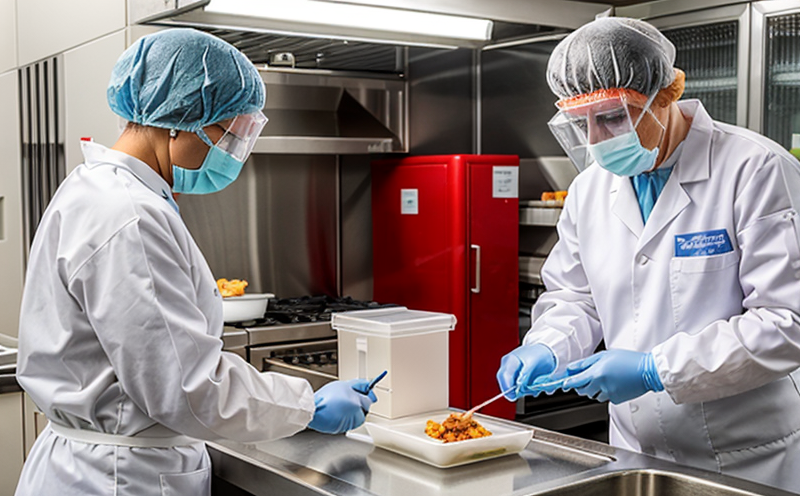USDA MLG 23.01 Detection of Hepatitis A Virus in Imported Fruits
The USDA MLG 23.01 test method is a critical tool for the detection of hepatitis A virus (HAV) in imported fruits, ensuring that produce reaching American consumers meets stringent safety and health standards. This test plays an essential role in protecting public health by preventing the spread of viral contamination through food products.
Developed specifically to meet the needs of the global fruit industry, this method is designed for use with a variety of imported fruits such as pomegranates, grapes, apples, and citrus fruits. The test protocol involves rigorous specimen preparation, stringent testing conditions, and meticulous interpretation of results to ensure accurate detection.
The USDA MLG 23.01 test follows the guidelines set forth in ISO/ASTM standards, ensuring that all procedures are conducted under controlled conditions to yield reliable results. This method is particularly relevant for imported fruits due to their potential as vectors for virus transmission during transit and storage.
Testing involves several steps: first, the fruit samples must be thoroughly washed and cut into appropriate sizes. Next, tissue homogenates are prepared from the fruit pieces using a buffer solution to extract viral particles. The extracts are then subjected to nucleic acid extraction techniques followed by reverse transcription-polymerase chain reaction (RT-PCR) amplification to detect the presence of HAV.
The entire process is designed to ensure that even minute quantities of HAV can be detected, making it a highly sensitive and specific test method. The results are reported in terms of viral load per gram or per liter, providing actionable insights for importers and processors regarding the safety of their products.
Importantly, this testing approach is not only effective but also cost-efficient, helping companies comply with regulatory requirements while minimizing risks associated with viral contamination. By adhering to established protocols, laboratories can provide reliable data that supports informed decision-making throughout the supply chain.
| Sample Preparation | Testing Methodology | Result Interpretation |
|---|---|---|
| Washing and cutting of fruit samples into appropriate sizes. Fruit tissue homogenization using a buffer solution. |
Nucleic acid extraction followed by RT-PCR amplification for HAV detection. | Viral load per gram or per liter is reported to indicate the presence or absence of HAV. |
The USDA MLG 23.01 test method is widely used in quality control departments and R&D laboratories within the food processing industry. Its application ensures that imported fruits meet strict safety standards before being distributed for consumption. By adhering to this protocol, companies can enhance consumer trust while maintaining compliance with international health regulations.
The sensitivity of the USDA MLG 23.01 test method is particularly significant given the potential risks associated with viral contamination in food products. The ability to detect even trace amounts of HAV ensures that imported fruits are safe for consumption, thereby protecting public health.
- Ensures compliance with international standards set by ISO/ASTM.
- Provides reliable data supporting informed decision-making throughout the supply chain.
- Enhances consumer trust in food products through rigorous testing procedures.
Industry Applications
The USDA MLG 23.01 test method is particularly relevant for importers and processors of fruits destined for American markets. This method ensures that imported produce meets stringent safety standards, thereby protecting public health from the risks associated with viral contamination.
| Imported Fruits | Risks Associated With Contamination |
|---|---|
| Pomegranates Grapes Apples Citrus fruits |
Viral transmission during transit and storage. Contamination risks in processing facilities. |
- Importers: Ensure compliance with strict safety standards to avoid recalls and fines.
- Processors: Maintain the integrity of their supply chain by ensuring imported fruits are free from viral contamination.
- R&D Engineers: Develop safer processing methods and storage solutions to minimize risks associated with viral transmission.
- Purchase Officers: Choose suppliers who adhere to stringent testing protocols like USDA MLG 23.01 to ensure product safety.
The widespread adoption of this test method by importers, processors, R&D engineers, and purchase officers underscores its importance in safeguarding public health and maintaining consumer trust.
Eurolab Advantages
EuroLab is committed to providing world-class testing services that meet the highest standards of accuracy, reliability, and efficiency. Our expertise in food and feed testing enables us to offer unparalleled support for clients seeking to ensure the safety and quality of their imported fruits.
- ISO/IEC 17025 Accreditation: Ensures that all our tests are conducted according to internationally recognized standards, providing confidence in the reliability of our results.
- Experienced Professionals: Our team comprises highly skilled scientists and technicians with extensive experience in food safety testing.
- Advanced Equipment: Equipped with state-of-the-art instruments that ensure precise and accurate test results.
- Dedicated Support: We offer personalized services tailored to meet the specific needs of our clients, ensuring they receive timely and comprehensive support throughout their testing process.
At EuroLab, we understand the critical importance of food safety in protecting public health. Our commitment to excellence ensures that every test conducted is accurate, reliable, and upholds the highest standards of integrity.
Competitive Advantage and Market Impact
EuroLab's proficiency in conducting USDA MLG 23.01 tests for HAV detection offers significant competitive advantages to our clients, particularly those involved in importing and processing fruits destined for the American market. This expertise positions us as a trusted partner in ensuring food safety and quality.
- Enhanced Reputation: Clients benefit from an enhanced reputation among consumers, importers, and regulatory bodies due to our adherence to strict testing protocols.
- Increased Compliance: By meeting stringent USDA standards, clients avoid the risks associated with non-compliance penalties and potential market disruptions.
- Improved Customer Trust: Our commitment to food safety fosters a strong relationship between importers and consumers, enhancing overall trust in imported fruits.
EuroLab's leadership in this area contributes positively to the broader market by setting benchmarks for quality and safety. This not only benefits our clients but also helps maintain consumer confidence and support sustainable business practices within the food industry.





